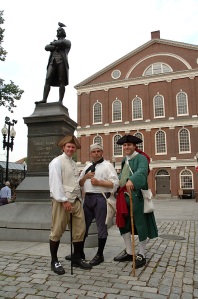A running history of Patriot’s Day
Long-time Extension School instructor and alumnus Robert J. Allison, ALB ’87, PhD ’92, professor and chair of history at Suffolk University, shares a swift history on the origins and evolution of Patriot’s Day in Massachusetts. For those who prefer the audio-video version to the text below, Allison delivers his short, 7-minute history lesson here.
As it was in the beginning
The Puritans left behind two holidays. They set aside a day in the fall to give thanks to God for the blessings of the year and for not exercising his judgment on them. They set aside a day in the spring for fasting and prayer, imploring God’s aid in the coming year, atoning for their sins, and imploring God not to exercise his judgment on them.
Both holidays persisted well into the nineteenth century as Thanksgiving, in November, and Fast Day, in April, became part of the official calendar. Thanksgiving was given a considerable boost during the Civil War when President Lincoln revived the custom, which Presidents Washington and Adams had begun, of proclaiming a national day of Thanksgiving. After the war, the national day of Thanksgiving became a time to spend with family and to give thanks for the blessings of life.
Fast Day, always in April, had a tougher time in a more secular age. We prefer counting our blessings to reflecting on our sins. By the 1880s, Massachusetts citizens were not spending Fast Day reflecting on their sins, but were spending what was often the first nice day of the year as a holiday—not a holy day—outdoors, with boat and bicycle races, and a noticeable amount of public drinking. Something needed to be done.
Massachusetts officialdom was moved to act. It was too late to get the citizens back to fasting, but perhaps a more meaningful holiday would capture their solemn civic attention.
A tale of two towns
The town of Concord had a solution. It observed every April 19 as Concord Day, the anniversary of the 1775 battle. Ralph Waldo Emerson had even written a poem about Concord’s embattled farmers, their flag unfurled to the April breeze, firing a shot heard round the world. Concord suggested that all citizens of the Commonwealth celebrate Concord Day.
The other 350 towns did not jump at the chance to celebrate Concord, particularly not the town of Lexington. Every year on April 19, Lexington celebrated the Battle of Lexington, where, in 1775 they declared, the actual war had begun before Concord’s embattled farmers were out of bed. Lexington suggested April 19 be observed as Lexington Day.
No one outside of Lexington or Concord had much enthusiasm for either proposal. The two towns jointly proposed April 19 as Lexington AND Concord Day, a noble compromise on their part, but still not enough to draw support from 349 other towns.
A patriotic resolution
Governor Frederic Greenhalge had no parochial interest in either Lexington or Concord. In fact, he had been born in England. Immigrating to Lowell as a child, he worked in the textile mills before serving in the Civil War, becoming a lawyer, and eventually mayor of his adopted city. Elected governor in 1893, Greenhalge’s more pressing problems were resolving labor disputes and preventing riots by the unemployed.
But Greenhalge’s most lasting legacy was proclaiming April 19, 1894, as Patriot’s Day, noting that anniversary of both the beginning of the war for Liberty in 1775 and the first blood shed of the Civil War in 1861. Patriot’s Day commemorated not Lexington and Concord, but Liberty and Union.
That first Patriot’s Day, April 19, 1894, had proper commemorations of the Revolution and Civil War. But also, as the weather was fine, there were boat races and bike races—with several hundred riders setting off on a ride from Concord to Boston—and there was even a fair amount of public drinking.
Off and running
Inspired by the 1896 Olympics in Athens, the Boston Athletic Association in 1897 organized a marathon from Ashland to Boston on April 19. New York runner John McDermott was the first of 10 runners to complete the 24.5 mile race, doing so in two hours, 55 minutes, 10 seconds. The following year, a swift-footed Canadian named Ronald MacDonald won the race, beating 25 others. Despite being a foreigner, MacDonald made Bostonians proud—he was a student at Boston College, and in the last miles he beat a New Yorker.
In the late 1960s the United States observed a serious shortage of three-day weekends, and sought to correct this by shifting traditional holidays honoring historic events to a convenient Monday. In Massachusetts, Patriot’s Day was shifted to the third Monday in April, where it has remained since 1969.
All this may seem extraneous at Harvard, which predates both the Revolution and the Civil War, and does not observe Patriot’s Day. The rest of Massachusetts does—with re-enactments of Paul Revere’s Ride from Charlestown to Lexington, and William Dawes’s Ride from Boston and Roxbury to Concord, re-enactments of the battles of Lexington and Concord, historical reflections, as well as the Marathon, a Red Sox game at Fenway Park, and other outdoor activities.
This leisure is made possible by the sacrifices of those who fought for Liberty and Union; or as Emerson said of the embattled Concord farmers, they “dared to die and leave their children free.”
Enjoy Allison’s history lesson? His 2012-13 courses will be posted to the Extension School website in early June. Until then, you can check out the three courses he taught this past year: History of American International Relations (fall), The American Revolution in Boston (January), and The History of Boston (spring). Allison has also published several short history books on Boston, the Revolution, and Cape Cod.
Leave a Comment
Be the first to comment!

Leave a comment